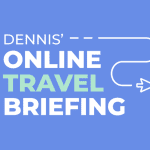Skift Take
What happened to the good old days of rich travel companies getting richer through digital marketing? Ha. Airbnb said brand marketing and public relations (both forms of storytelling) let it reduce its reliance on performance marketing.

Dennis' Online Travel Briefing
Editor’s Note: Every Wednesday, Executive Editor and online travel rockstar Dennis Schaal will bring readers exclusive reporting and insight into the business of online travel and digital booking, and how this sector has an impact across the travel industry.
Online Travel This Week
It’s another earnings season so online travel companies such as Airbnb, Expedia and Tripadvisor occasionally present facts in a misleading — or at least in an exceedingly positive-sounding — way.
Airbnb Productivity
Airbnb officials mentioned twice in their discussion last week with financial analysts about 2022 earnings that their roster of 6,800 employees at the end of 2022 was 5 percent lower than during pre-pandemic 2019 yet Airbnb’s revenue has increased 75 percent to $8.4 billion.
That means significantly more revenue per employee these days.
What Airbnb execs didn’t mention, however, is that Airbnb at the end of 2022 “relied on a global network of approximately 11,000 third-party contingent workers to handle the vast majority of our community support contacts,” as noted in its annual financial filing.
As with the size of its full-time workforce, which Airbnb reduced by 25 percent in May 2020, the company likewise terminated many contract workers, and a bunch of them handled customer service, at that time. Airbnb hasn’t disclosed how many third-party contract workers it added in the interim, and how this may have impacted the productivity numbers the company boasts about.
Expedia U.S. Is a Thing
Expedia has often spoken about how it performed in the U.S., its biggest market, but it seldom talks about “Expedia U.S.,” as it did seven times in its fourth quarter earnings call earlier this month, as if Expedia U.S. were a new division or a separate brand.
Expedia Group sought to showcase the performance of the Expedia brand in the U.S. because it intentionally gave short shrift in marketing to some other geographies around the world and de-emphasized certain noncore brands, too.
Expedia U.S. saw its loyalty numbers jump 300 percent in the fourth quarter compared with the same period in 2019, and it has nearly 60 percent more engaged app users, the company said.
No word on how the loyalty program and engaged app user numbers might have jumped or declined on a global basis, though.
Overall, some of that upside in the U.S. got deflated with under-performance abroad so Expedia was putting a pretty shine on the statistics it brought to the fore.
“Of course, when you look at our all-up B2C (business to consumer) numbers, the accelerating performance of Expedia U.S. has been largely offset by our intentional de-emphasis of some smaller noncore brands or pull back in certain geographies where we did not have the right model, and of course, our much-discussed technical migration, which required significant work and like all migrations resulted in some short-term friction,” Expedia Group Peter Kern said.
But Expedia faces challenges even in its U.S. home turf. A Skift Research survey of U.S. travelers found that Expedia’s U.S. “websites saw a 10 point share decline, falling from 59 percent of OTA [online travel agency] bookings in 2020 to 49 percent in 2022.”
Booking.com is seemingly behind some of Expedia’s weakness.
“Right off the bat, the most shocking result is that, in our survey data, Booking.com surpassed Expedia.com as the most used booking site in the U.S. in 2022,” the Skift Research report found. “Expedia.com had been number one in 2020 and 2021 with Booking.com in second place.”
That would be a disturbing result for Expedia in its homeland.
Tripadvisor Metasearch in the U.S. Bounced Back
Hotel metasearch is an important part of Tripadvisor’s core business, and the company disclosed last week that the feature’s revenue only clawed back in 2022 to 85 percent of 2019 levels.
The company also stated that its U.S. metasearch revenue — as distinct from its global metasearch revenue — achieved “parity” in 2022 with 2019 numbers, and was accelerating as it headed into 2023.
What parity means wasn’t specifically defined but, hey, fair enough.
In Brief
Section 230 Challenges
The U.S. Supreme Court is hearing a case that could potentially upend online travel in unforeseen ways. The case revolves around a challenge to Section 230 of the Communications Decency Act, which for years has given online platforms in the U.S. broad liability protections for review and video content they host that is created by third parties. A ruling striking down parts of Section 230 could alter the business models of numerous travel and tech companies. CNBC
Trivago and Tripadvisor Metasearch Fell Behind
Is metasearch dead? Hardly, just ask Google. But two of the sector’s weaker public company players, Trivago and Tripadvisor, saw their metasearch numbers at lethargic levels compared with other sectors in 2022. Skift
Tripadvisor Generative AI Issues
Can you think of a more easy application for generative AI to attach itself to than creating an in-destination tour? Tripadvisor’s turnaround strategy involves creating new trip-planning tools that are distinct from the competition. Will generative AI make that even more difficult or, on the other hand, create a bigger revenue stream for Tripadvisor as a licensor of its hotel review content? Skift
The Daily Newsletter
Our daily coverage of the global travel industry. Written by editors and analysts from across Skift’s brands.
Have a confidential tip for Skift? Get in touch
Tags: airbnb, apps, earnings, expedia, future of lodging, generative ai, loyalty, marketing, metasearch, online travel newsletter, Skift Pro Columns, tripadvisor, trivago, user reviews